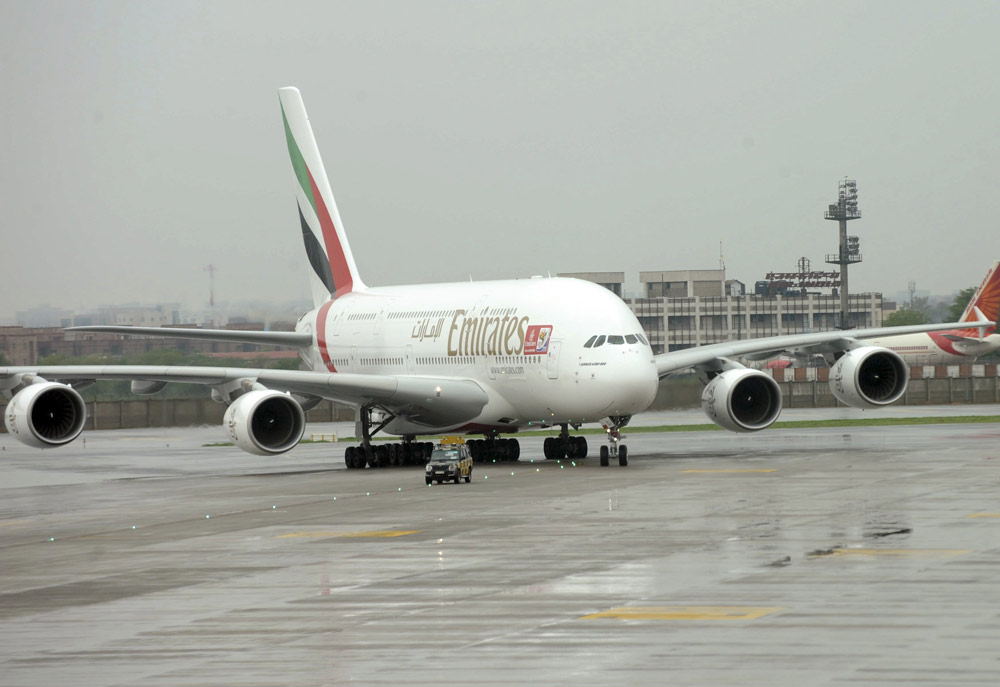Emirates Airline is in talks with plane manufacturer Airbus and the Engine Alliance after one of its A380 aircraft was forced to return to Australia after suffering engine failure midflight. However, the carrier has no plans to ground its fleet of superjumbos, an executive confirmed.
“We had, as you’ve heard in the news, an event out of Sydney with one of the engines. We are talking with the Engine Alliance, the manufacturer of the engines, and having to address some of the issues we have on our engines,” Adel Al Redha, executive vice president of engineering and operations at Emirates, told Arabian Business.
On November 11, an Emirates Airline A380 jetliner with 380 passengers on board was just 20 minutes into its flight from Sydney to Dubai and climbing at an altitude of 10,000 ft when it experienced a problem with one of its four engines.

| Advertisement |
The Dubai carrier is the largest operator of the A380, with a fleet of 26 in service and another 64 on order. However, Al Redha said the incident did not warrant grounding the double-decker aircraft.
“We have removed any concern operationally. There is absolutely no need to ground. There will be maintenance requirement to be done but there will be no such thing as grounding the fleet,” he said.
In a statement, Emirates confirmed passengers had been re-booked on alternative flights, but Al Redha said there had been minimal loss of revenue.
“Any time an aircraft comes back to [the] stand or comes back before it has finished its journey it is an additional cost and obviously we take this one up with Airbus and General Alliance,” he said.
A mid-air engine blow-out in November 2010 on an A380 using Rolls Royce Trent engines prompted Australia's Qantas Airways to ground its entire fleet of Airbus superjumbos for nearly a month.
Emirates, with the world's biggest A380 fleet, uses rival GP7200 engines built by Engine Alliance, a joint venture between General Electric and Pratt & Whitney, a unit of United Technologies Corp.
Engine Alliance said it was trying to determine the cause of the failure.
"The Engine Alliance is investigating root cause of the engine event and will initiate prompt corrective action," the companies said in a statement to Reuters.
An Airbus spokesman said the company is working with the engine makers and Emirates to determine the cause.
Passengers on the A380, manufactured by Airbus parent EADS, said the superjumbo experienced a "judder" and then they saw flames shooting several metres out of one of the engines.
"I saw a flash. I thought it could have been lightning, but then we saw flames come out of the engine. The whole interior of the A380 lit up," passenger John Fothergill, 49, from New Zealand told Australia's Daily Telegraph newspaper. Emirates later said there was no fire, although "passengers may have seen a flash."
The A380, manufactured in Toulouse from parts sourced across Europe, has also been affected by cracks in the wings of a small number of aircraft.
There are 18 airlines currently using the aircraft with total orders outstanding at 262.
Earlier this month, prior to the Sydney A380 incident, Airbus’ parent company EADS said costs relating to repairing wing cracks in the A380 had cost it €200m (US$255m) in 2012 so far.









 Search our database of more than 2,700 industry companies
Search our database of more than 2,700 industry companies









